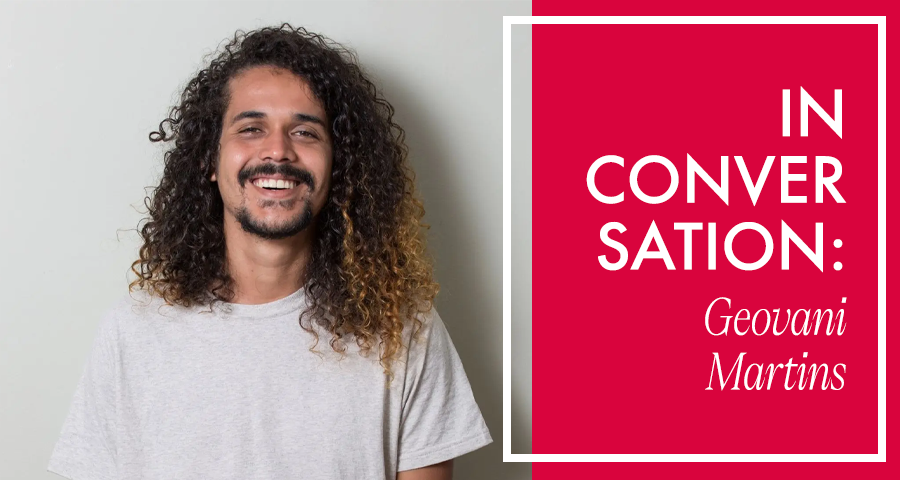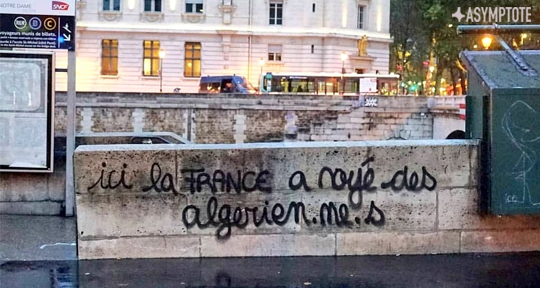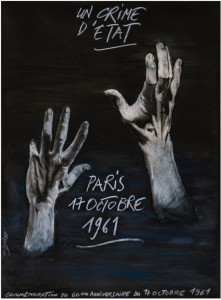Geovani Martins’s Via Ápia is a novel set in Rocinha, Rio de Janeiro’s largest favela, and takes place from July 27, 2011 to October 26, 2013. During this time, the lives of the neighborhood’s residents were profoundly altered by a military occupation and “pacification” in anticipation of the upcoming World Cup; in exploring the fall out, Via Ápia describes what happens when the vitality of carpe diem meets the fate of broken young men—those who had “been born poor, [were] still poor, and would die poor.”
In this interview, I spoke with Martins about setting narrative expectations, telling the collective stories of residents in occupied Rocinha, and collaborating with his translator, Julia Sanches, in bringing this epic novel into English.
Tiffany Troy (TT): The first sentence of Via Ápia is: “They aren’t singing ‘Happy Birthday’ for another hour.” How does this set up the novel that follows?
Geovani Martins (GM): My intention with that opening was to prepare the reader in following the many expectations that the characters will face throughout the story. Early in the book, we learn that the police are planning to occupy Rocinha, and the entire first part is structured around this anticipation that surrounds the characters. Since it’s an official operation, there’s even a set date for the arrival of the police, which creates something like a countdown to this transformative event. So that reference to the clock right at the beginning helps, in an interesting way, to place the reader in this race against time.
TT: Can you speak about the overarching structure of this novel? How did you come to having three parts, and why repeat “RIO” in each of the chapter titles?
GM: When I was thinking about structure, the first major decision was to work with five characters. I initially considered a simpler structure, focused only on two brothers, but I soon realized that my intention with Via Ápia was to tell a collective story. I wanted to speak more broadly about a generation that was deeply affected by this moment of police repression. In trying to paint that wider picture, I defined each character around the main themes I wanted to explore in the book, so that each one would allow me to deepen a different perspective on the situation. I wasn’t interested in just one character’s view; what mattered to me was the intersection of their experiences. READ MORE…




Compass and Rifle: On Roque Dalton’s Stories and Poems of a Class Struggle
No one escapes Dalton’s inquisitive pen . . .
Stories and Poems of a Class Struggle by Roque Dalton, translated from the Spanish by Jack Hirschman, Seven Stories Press, 2023
On Thursday, July 6, 2023, the inaugural day of Guatemala’s International Book Fair (FILGUA), the government of El Salvador requested organizers to exclude Salvadoran author Michelle Recinos’ Sustancia de hígado (F&G Editores) from the fair. The next day, online news outlet elfaro revealed that El Salvador’s ambassador in Guatemala had said, “It would’ve been an unpleasant thing for the government of El Salvador if this book had been a part of the fair.” Details are scarce, but presumably, this action was related to Michelle’s story Barberos en huelga, winner of the 2022 Mario Monteforte Toledo Prize, which openly criticizes sitting president Nayib Bukele’s war on gangs.
Hearing this, I can only imagine what Roque Dalton would have written about Bukele.
Roque Dalton’s Historias y poemas de una lucha de clases (Stories and Poems of a Class Struggle) dates back to 1975, and remains as timely as ever. In a time when most Central American countries are under authoritarian regimes and have experienced backslides of democracy, the life and work of Roque Dalton is at once a beacon of hope, an inspiration, and a warning sign. Historias y poemas de una lucha de clases is a book filled with courageous testimony, the poet’s typical dry humor, and bone-chilling depictions of state violence. Here, Dalton is hyperaware of the pain and plight of his compatriots, but in addition to his typical grittiness and social critique, we also find tenderness, softness, beauty, and frailty; Dalton’s acute perception is both a rifle and a compass, manifesting in words of both rebuke and encouragement.
READ MORE…
Contributor:- José García Escobar
; Language: - Spanish
; Place: - El Salvador
; Writers: - Alaíde Foppa
, - Carlos Fonseca
, - Ernesto Cardenal
, - Jack Hirschman
, - Jaime Barba
, - Julio Delfos Marín
, - Luis de Lión
, - Luis Melgar Brizuela
, - Margaret Randall
, - Michelle Recinos
, - Otto René Castillo
, - Roque Dalton
; Tags: - authoritarianism
, - Central American literature
, - class struggle
, - elfaro
, - F&G Editores
, - fascism
, - FILGUA
, - Mario Monteforte Toledo Prize
, - Salvadoran literature
, - Salvadoran poetry
, - Seven Stories Press
, - social commentary
, - social critique
, - state violence